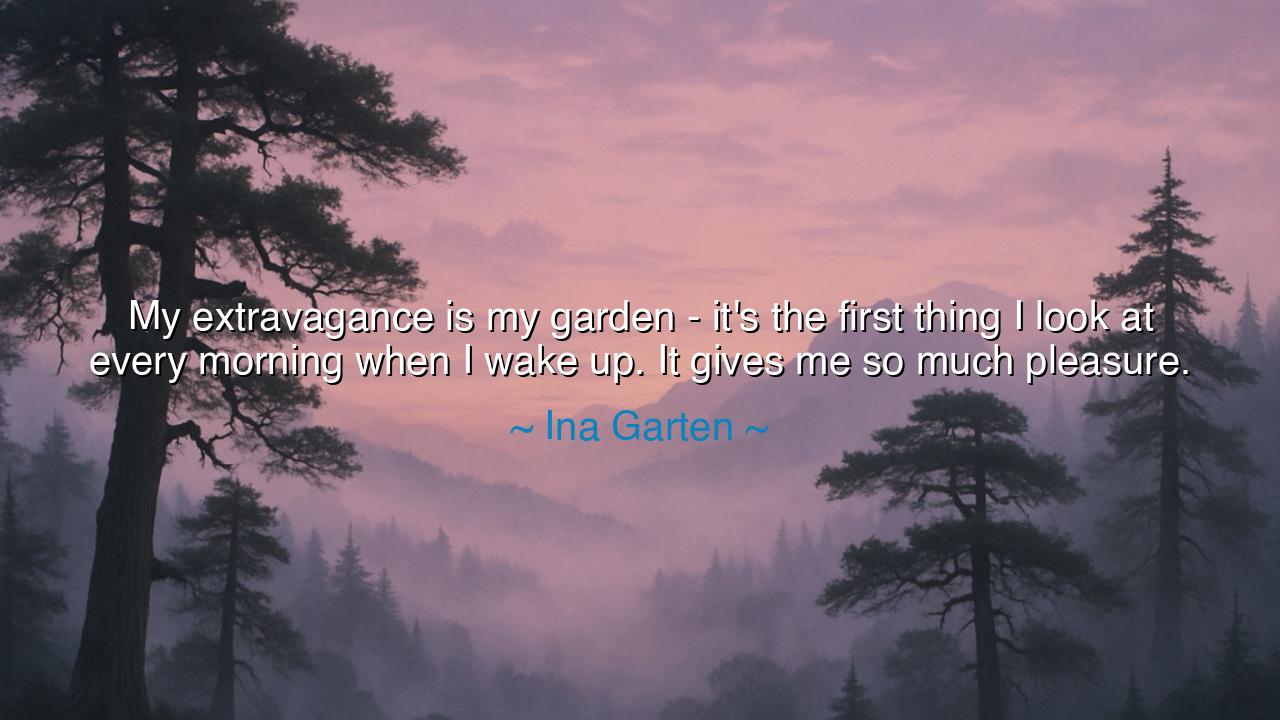
My extravagance is my garden - it's the first thing I look at
My extravagance is my garden - it's the first thing I look at every morning when I wake up. It gives me so much pleasure.






O Seekers of Fulfillment, listen closely to the words of Ina Garten, for they hold the key to a life well-lived, a life nourished not just by food or wealth, but by the deep, nourishing joy found in the act of cultivating life. "My extravagance is my garden - it's the first thing I look at every morning when I wake up. It gives me so much pleasure." In these words, Garten speaks to the sacred and often underestimated joy of gardening—an act of creation that transcends the mundane and becomes a deeply personal form of self-expression. Her garden is not simply a patch of earth; it is the first fruit of her morning, a ritual of connection, and a source of pleasure that feeds her soul before anything else.
In the ancient world, gardens were not just cultivated for sustenance but were sacred spaces, reflecting a deep bond between humanity and the divine rhythms of nature. The Egyptians, for example, believed that the earth was a living being, and their gardens were created to honor the gods. The mighty gardens of Babylon, one of the Seven Wonders of the Ancient World, were designed not only for beauty but for the nourishment of the spirit. Garten’s garden, like those of the ancients, becomes a place where the physical and spiritual intersect, where the act of tending to plants is not just about growing food or flowers, but about cultivating pleasure, joy, and balance in life.
Consider also the great Epicurus, the philosopher who taught that the key to happiness was found in simple pleasures—those that are deeply connected to nature, friendship, and knowledge. Epicurus lived in a garden, teaching his followers that true joy arises when we engage in life’s simple, yet profound, experiences. Garten’s daily ritual of looking at her garden mirrors this ancient philosophy. It is not the extravagance of wealth or power that brings her pleasure, but the beauty of nature, the quiet connection to the earth, and the nurturing of life in its purest form.
Gardens have always held a special place in the hearts of those who seek meaning and peace. The Buddhist monks, too, understood this deep connection to the earth. Their gardens were places of meditation, where every plant and stone had purpose, contributing to the overall balance and harmony of their lives. They did not merely tend to the plants; they tended to their souls, using the act of gardening as a means of reflection, mindfulness, and spiritual nourishment. In the same way, Garten’s garden provides not only visual beauty but a space for daily reflection, where each moment spent with the plants becomes a moment of gratitude, peace, and inner contentment.
The lesson here, O Seeker, is profound: to find joy in extravagance is not to seek excess or luxury in material wealth, but to find that pleasure in the simple, yet noble, acts of creation. When Garten says her extravagance is her garden, she speaks of the richness found not in things, but in the experience of being present with the earth, the plants, and the process of life itself. Gardens remind us that joy does not have to come from external sources; it can come from cultivating something within our reach, something that grows and changes with time. Pleasure is not always in grand gestures, but in the simple act of nurturing, of caring for what we love, whether it be a plant, a project, or a person.
In practical terms, O Seeker, ask yourself: what is your own garden? What is that source of joy that nourishes your soul, that gives you pleasure beyond the ordinary? It could be the creation of a space in your home, the pursuit of an art, or a relationship that you tend to with love. Just as Garten finds her joy in the act of gardening, you too must discover that which brings you the deepest sense of connection and fulfillment. Nurture this, just as you would tend a garden, with patience, tenderness, and consistency, and you will find that it gives back to you more than you could ever expect.
So, O Seeker, take this wisdom into your life. Find your garden—the space that brings you joy and peace. Let it be your source of inspiration, your place of daily reflection, and your reminder that true extravagance is found not in things, but in experiences that nourish the soul. Just as Ina Garten finds her pleasure in the garden, may you too find yours, and may that joy help you grow, bloom, and thrive in every area of your life. Nurture your garden, and you will see that it nurtures you in return.






AAdministratorAdministrator
Welcome, honored guests. Please leave a comment, we will respond soon